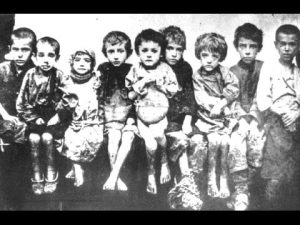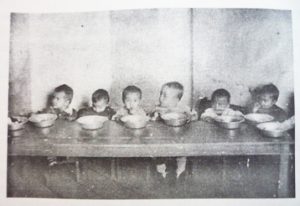A simple priest from Sokal, Ivan Kypriyan is not well-known to the general public. Father Ivan was well-educated, from a good family, and a servant of God and his people. In 1934, he died together with a group of children in a soviet gulag. When he learned that the children were to be executed, he made a few angel figures from sugar and went to sit with the condemned children in their outdoor cage.
The execution was postponed due to a heavy snowstorm. Four days later, the soviet guards found the frozen bodies of Father Ivan and his children lying in the cage.
 Ivan Kypriyan was born in an aristocratic family in Sokal, Lviv Oblast on October 27, 1856.
From 1879 to 1883 he finished secondary school and received a spiritual education at the Peremyshl Seminary (today’s Przemysl, Poland). He also studied music and earned a degree in orchestral conducting. From 1904-1914, he served as parish priest in the village of Shumyach, Turkivsky Raion, and then in Nemiriv, Rava-Rusky Raion. He conducted church choirs, wrote spiritual music, recorded folk songs, and promoted musical compositions by Ukrainian composers, such as Dmytro Bortniansky, Anatol Vakhnianyn, Viktor Matiuk, etc.
Father Ivan took an active part in public and political life. In Nemyriv, he presided over the Prosvita Literary Society, and, as member of the National Democratic Party, ran for Parliament.
In 1916, Father Ivan joined the Ukrainian Sich Riflemen. When the Ukrainian National Rada – a council formed in Lviv to represent the Ukrainian ethnic territories within the Austro-Hungarian Empire in their quest for self-determination - was proclaimed on October 18, 1918, Ukrainian activists in western Ukraine mobilized to take power all across Galicia. During the November uprising against Austrian authority in Lviv in 1918, Ivan Kypriyan, the village elder Vasyl Kalitsynsky and local activists ousted the Austrian administration and took over the town of Nemyriv.
Father Ivan volunteered to act as chaplain with the Ukrainian Galician Army and accompanied his men throughout all the military campaigns in Halychyna (Galicia) and even beyond the Zbruch River.
In 1920, Father Ivan was arrested by the communist regime and exiled to Siberia. Unfortunately, there is no record of Father Ivan’s exact place of interment. The UGCC Historical Mission addressed an official request for information on Father Ivan Kypriyan to the Russian FSB, but has received no reply to date.
In the gulag, the Ukrainian priest suffered hunger, illness, bullying and torture at the hands of the Bolsheviks. In his historical study Field Chaplains of the Ukrainian Galician Army: In Commemoration of the 45th Anniversary of the Liberation Movement, Winnipeg 1963 (Полеві духовники УГА: у 45-річчя участи у Визвольних змаганнях), Father Ivan Lebedovych writes:
Ivan Kypriyan was born in an aristocratic family in Sokal, Lviv Oblast on October 27, 1856.
From 1879 to 1883 he finished secondary school and received a spiritual education at the Peremyshl Seminary (today’s Przemysl, Poland). He also studied music and earned a degree in orchestral conducting. From 1904-1914, he served as parish priest in the village of Shumyach, Turkivsky Raion, and then in Nemiriv, Rava-Rusky Raion. He conducted church choirs, wrote spiritual music, recorded folk songs, and promoted musical compositions by Ukrainian composers, such as Dmytro Bortniansky, Anatol Vakhnianyn, Viktor Matiuk, etc.
Father Ivan took an active part in public and political life. In Nemyriv, he presided over the Prosvita Literary Society, and, as member of the National Democratic Party, ran for Parliament.
In 1916, Father Ivan joined the Ukrainian Sich Riflemen. When the Ukrainian National Rada – a council formed in Lviv to represent the Ukrainian ethnic territories within the Austro-Hungarian Empire in their quest for self-determination - was proclaimed on October 18, 1918, Ukrainian activists in western Ukraine mobilized to take power all across Galicia. During the November uprising against Austrian authority in Lviv in 1918, Ivan Kypriyan, the village elder Vasyl Kalitsynsky and local activists ousted the Austrian administration and took over the town of Nemyriv.
Father Ivan volunteered to act as chaplain with the Ukrainian Galician Army and accompanied his men throughout all the military campaigns in Halychyna (Galicia) and even beyond the Zbruch River.
In 1920, Father Ivan was arrested by the communist regime and exiled to Siberia. Unfortunately, there is no record of Father Ivan’s exact place of interment. The UGCC Historical Mission addressed an official request for information on Father Ivan Kypriyan to the Russian FSB, but has received no reply to date.
In the gulag, the Ukrainian priest suffered hunger, illness, bullying and torture at the hands of the Bolsheviks. In his historical study Field Chaplains of the Ukrainian Galician Army: In Commemoration of the 45th Anniversary of the Liberation Movement, Winnipeg 1963 (Полеві духовники УГА: у 45-річчя участи у Визвольних змаганнях), Father Ivan Lebedovych writes:
“He was a saintly man, even though he was dirty, dressed in rags, and known commonly as “No.8986 from Barrack No.A-322”... His story is closely linked to the concentration camps in distant Siberia, where hunger, torture and daily beating set the tempo of everyday life, darken each dawn of the frosty Siberian sky, where evenings bring no rest to weary bodies, no peace to men’s hearts, nor even a glimmer of hope for a better tomorrow… in this dark hole of total misery and enslavement.”The Bolshevik Gulag system spared no one. One day, a group of very young children was brought into Barrack No.A-332, where Father Ivan was also incarcerated. They were the children of “enemies of the people”, whose parents had been summarily executed by the soviet regime. As these unfortunate children received little food, few of them could survive the harsh Siberian winters. Dressed in filthy rags, these children were no longer children, but ghosts of themselves; many of them died silently from starvation and disease.

“His face was blue and yellow; the skin was cracked and inflamed, the nose was also broken and a dark blue, almost black shade due to hard blows during repeated beatings. Several open wounds were visible on the chin. But, his eyes glowed with love… not only towards his friends but also towards his enemies.”Over seventy children were in Father Ivan’s care. Every day, he celebrated the Divine Liturgy for little children who were paralyzed or who had gone mad. He embraced them warmly, drawing them close to his side and comforting the weeping infants as best he could. Father Ivan buried the dead himself, carrying each frail body to the grave and whispering prayers for his/her soul. All the prisoners deeply respected him and helped protect the children as best they could.

“A formidable storm raged all round the camp. Nothing can be more frightening and dangerous than a Siberian blizzard; it’s like an enraged whirlpool… there’s no sense of direction, no west, no east, no south, and no north; only the whistling wind and swirling snow. Wolves perish, and dogs can no longer sniff out the freshest trails. But, Father Ivan decided to leave his warm bed in the barracks and find the cage…”The snowstorm lasted four days and the execution was postponed. When the blizzard finally came to an end, the guards found Father Ivan’s body in the cage together with his frozen children. He was holding a little boy’s hand. These tragic events occurred in 1924... A stained glass window in memory of Father Ivan Kypriyan and his martyred children, designed by artist Ihor Voloshyn from Ivano-Frankivsk, was inaugurated in the Church of the Assumption of the Blessed Virgin Mary in Koziv, Ternopil Oblast on May 7, 2017.


